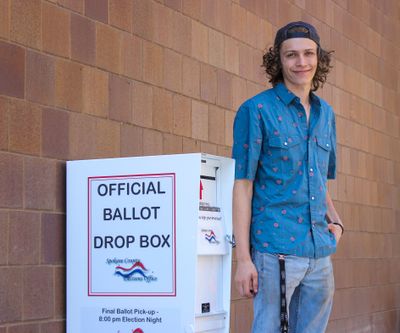We the People: Around 700 Spokane County 17-year-olds can vote in the August primary

Each week, The Spokesman-Review examines one question from the Naturalization Test immigrants must pass to become United States citizens.
Today’s question: What is one way Americans can serve their country?
Willow Hall-Cottrill won’t turn 18 until October, but she’ll cast her first ballot in a Spokane County election next month.
After the overturning of Roe v. Wade and recent acts of gun violence, Hall-Cottrill believes young voices matter now more than ever.
Hall-Cottrill is taking advantage of a Washington law that allows 17-year-olds to vote in congressional primaries (this year on Aug. 2) as long as they turn 18 by the general election, which is Nov. 8 this year.
“The consequences of elections directly affect those under the age of 18,” she said. “The excuse that maturity levels are lacking are very easy to argue against when looking at how many teens are being forced to fight for their rights.”
Besides voting, there are many ways Americans can serve their county, according to the answers on the naturalization test. They include:
• Serving in the military.
• Running for office.
• Working for the local, state or federal government.
Voting is a right that has never been guaranteed to everyone, nor provided to every American citizen.
After the formation of the United States, only white, property-owning men at least 21 years old had the right to vote in most places.
While requirements for owning property gradually were eliminated by states, it took the Civil War and the 15th Amendment to give Black men the right to vote. Even so, that right was often stolen from them through racist policies like poll taxes and literacy tests that often had loopholes designed for whites only.
The 19th amendment gave women the right to vote in time for the 1920 election.
In 1962, Congress passed the 24th Amendment, which banned the poll tax or any other tax being required to vote.
Following the 24th Amendment’s ratification in 1964, Congress followed up with the Voting Rights Act of 1965. This was designed to stop schemes aimed at denying Blacks the right to vote.
Following the Vietnam War in 1971, the 26th Amendment lowered the voting age from 21 to 18. Many who supported the amendment argued that anyone who was old enough to fight in a war was old enough to vote.
As of Feb. 9, 2021, in 18 states, including Washington, 17-year-olds turning 18 by the time of the general election were permitted to vote in that year’s congressional primaries. The other 17 states that allow congressional primary voting by 17-year-olds are: Connecticut, Delaware, Illinois, Indiana, Kentucky, Maine, Maryland, Mississippi, Nebraska, New Mexico, North Carolina, Ohio, South Carolina, Utah, Vermont, Virginia and West Virginia.
The law allowing some 17-year-olds to vote in Washington’s primary was signed by Gov. Jay Inslee in 2018.
In Spokane County, more than 700 specialized ballots were mailed to 17-year-olds who fit in the necessary demographic for the 2022 voting season.
“I hope young voters will take advantage of this opportunity,” Spokane County Auditor Vicky Dalton said. “Young voters should use this opportunity to weigh in on who they will vote for in the general election.”
The opportunity to vote in congressional primaries encourages young voters to research the political landscape, what agendas are popular, and what current issues present nationally and locally.
“Teenagers actively participate in state-distributed public resources such as education,” said Owen Amble, 17, a Gonzaga Prep senior. “It’s important for teenagers to vote in these primary elections because they represent a group within themselves and they have the right to select a candidate for their state that they believe will positively benefit a community.”
The initial goal of this change was to ensure that young voters had a say in who they would vote for in the general election.
“I look for someone who I believe is a good person, and who shares views and beliefs with me. I will not automatically vote for one party, and will look deeply into each candidate to see who they are,” said Lewis and Clark High senior James Eberle, 17. “If someone is a Democrat, Republican or independent, that’s much less important to me than if they are a kind and intelligent person who can present themselves clearly.”